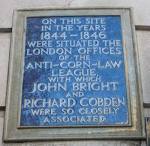George Wilson 1808 - 1870
April 25, 2009
 George
Wilson 1808 - 1870 was the
President and Chairman of the Anti Corn Law
League, founded in
1838, alongside John
Bright,
Richard
Cobden,
and Charles Pelham
Villiers.
George
Wilson 1808 - 1870 was the
President and Chairman of the Anti Corn Law
League, founded in
1838, alongside John
Bright,
Richard
Cobden,
and Charles Pelham
Villiers.
George Wilson was a patient of John Epps.
George Wilson was a colleague of John Stuart Blackie, William Ewart Gladstone, Robert Peel, and Francis Place.
George Wilson was President of the Anti Corn Law League in Manchester. He was one of the most able of contemporary campaigners and supervised and directed Anti Corn Law League activities and dealt with the administration from the League’s headquarters at Newall’s Buildings in Manchester.
He also dealt with the election of free traders as MPs, propaganda, public meetings, lecture tours, fund raising activities and so on. Charles Pelham Villiers was the mouthpiece of the Anti Corn Law League in parliament. He became MP for Wolverhampton in the late 1830s.
During the 1820s middle class political reformers were preoccupied with the reform of Parliament, but following the Reform Act of 1832, and the economic slump of the mid 1830s, concern over the inequalities caused by the Corn Laws grew.
The first Anti Corn Law Association was set up in 1836 in London and counted among its members Joseph Hume and Francis Place.
In 1838 a second Anti Corn Law Association was established in Manchester, which was led by Richard Cobden and John Bright. The members of this association were industrialists, but many were also dissenters and humanitarians who believed the issue had moral as well as economic implications.
They argued that the Corn Laws should be repealed in favour of free trade, as it would lower the price of bread, reducing the cost of living for workers. They thought free trade would increase the market for manufactured goods, and therefore increase levels of employment.
They also believed that exposing trade and agriculture to foreign competition would make it more efficient, and the expansion of trade would promote international peace. In 1839 the organization was put on a national footing as the Anti Corn Law League.
The League’s great advantages were that it was dedicated to a single measure and that it had ample funds. It used these to stage a sophisticated campaign in the Press and by post - the Penny Post was introduced in 1840 - as well as through well attended speaking tours, all coordinated by George Wilson from the Anti Corn Law League headquarters in Manchester.
At the 1841 general election it put up several candidates for election, and five including Richard Cobden were elected to Parliament, where they were able to attack the government of the day. The League’s disadvantage was that its opponents were the landed gentry who still dominated Parliament despite the Reform Act.
In 1844 the establishment of the Anti League augmented opposition to the League.
Robert Peel, prime minister from 1841, was thus presented with a dilemma. He had come to power vowing not to repeal the Corn Laws, but was persuaded by the Leaguer’s arguments for free trade.
His “free trade” budget in 1842 implemented a sliding scale for the tariffs on grain as well as reducing tariffs on other forms of imports. Eventually he was persuaded that he should do what was best for the country, not for the supporters of his party, and in 1846 the Corn Laws were repealed.